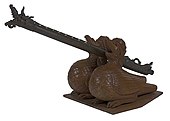Parang latok
| Parang latok | |
|---|---|
 A Parang Latok, circa 1800-1899. | |
| Type | Parang, Sword |
| Place of origin | Borneo (Sarawak, Malaysia[1] and West Kalimantan, Indonesia) |
| Service history | |
| Used by | Bornean Malay people, Dayak people (Bidayuh)[1] |
| Specifications | |
| Length | approximately 55 cm (22 in) |
| Blade type | single edged, one sided chisel grind |
| Hilt type | wood |
| Scabbard/sheath | wood |
A parang latok (which is also known as latok, latok buku or parang pathi) is a sword from Borneo in Sarawak, Malaysia; where it is regarded as the national weapon of the Sarawakian Malay people and the Bidayuhs (Land Dayak people),[1] and as well as Kalimantan, Indonesia. It also functions as a machete.
Its used for both timber felling, agricultural activities and warfare is characterised by the noticeable bent at an obtuse angle from one-third of its length starting from the pommel.[2] This parang features a single-edge blade that is heavier and wider towards the point of the blade. The handle of the parang latok is made of wood without a guard and often tied securely with rattan at its grip. It is carried in a long, two-piece wooden sheath to properly hold the blade.[3]
In the past, the parang latok is also used for executing condemned criminals, and the decapitation is normally achieved with a single blow.[4] This parang is used two-handedly, with one hand holding the hilt and the other holding the blade's shoulder, enabling its user to strike downwards.
A smaller version of the parang latok is called the buko, while another variant of the parang latok is known as the sadap.[5]
See also
References
- ^ a b c Frederick Boyle (1865). Adventures Among the Dyaks of Borneo. Hurst and Blackett. p. 35. OCLC 1040876361.
- ^ H. S. Cowper (2012). The Art of Attack and the Development of Weapons: from the Earliest Times to the Age of Gunpowder. Andrews UK Limited. ISBN 978-1-78150-359-1.
- ^ George Cameron Stone (1999). Glossary of the Construction, Decoration and Use of Arms and Armor in All Countries and in All Times. Courier Corporation. ISBN 0-486-40726-8.
- ^ Frederick Boyle (1865). Adventures among the Dyaks of Borneo. Hurst and Blackett. p. 118. OCLC 475350124.
- ^ Albert G Van Zonneveld (2002). Traditional Weapons of the Indonesian Archipelago. Koninklyk Instituut Voor Taal Land. ISBN 90-5450-004-2.



